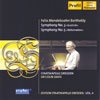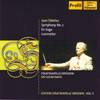Sibelius Symphony No 2; En Saga; Luonnotar
Vivid reminders of Davis's sojourn with a great band
View record and artist detailsRecord and Artist Details
Composer or Director: Felix Mendelssohn
Genre:
Orchestral
Label: Profil
Magazine Review Date: 6/2006
Media Format: CD or Download
Media Runtime: 73
Mastering:
Stereo
Catalogue Number: PH05048

Tracks:
| Composition | Artist Credit |
|---|---|
| Symphony No. 3, 'Scottish' |
Felix Mendelssohn, Composer
Colin Davis, Conductor Felix Mendelssohn, Composer Staatskapelle Dresden |
| Symphony No. 5, 'Reformation' |
Felix Mendelssohn, Composer
Colin Davis, Conductor Felix Mendelssohn, Composer Staatskapelle Dresden |
Composer or Director: Jean Sibelius
Genre:
Orchestral
Label: Profil
Magazine Review Date: 6/2006
Media Format: CD or Download
Media Runtime: 72
Mastering:
Stereo
Catalogue Number: PH05049

Tracks:
| Composition | Artist Credit |
|---|---|
| Symphony No. 2 |
Jean Sibelius, Composer
Colin Davis, Conductor Jean Sibelius, Composer Staatskapelle Dresden |
| En Saga |
Jean Sibelius, Composer
Colin Davis, Conductor Jean Sibelius, Composer Staatskapelle Dresden |
| Luonnotar |
Jean Sibelius, Composer
Colin Davis, Conductor Jean Sibelius, Composer Staatskapelle Dresden Ute Selbig, Soprano |
Author: Edward Greenfield
Interpretative contrasts with a conductor and orchestra who can be regarded as the custodians of the Mendelssohn tradition, Masur and the Leipzig Gewandhaus, are more marked. Their approach is cooler at speeds more flowing, particularly in slow movements. With Davis, the start of the Allegro in the first movement of the Scottish Symphony sidles in after the long introduction with a delicacy beyond that of Masur and his team. In the delectable Scherzo Davis’s speed is just as challengingly fast as Masur’s and the articulation of the rapid quaver movement is even clearer. At his relatively broad tempo Davis is wonderfully refined in the Adagio slow movement, with legato phrasing that is deeply persuasive without a hint of sentimentality, and the finale is thrusting.
The performance of the Reformation Symphony has similar qualities, with a hush of expectation in the slow introduction leading up to the first pianissimo statement of the ‘Dresden Amen’ theme, much more mysterious than the more forthright Masur. More controversially, Davis takes the Allegro vivace Scherzo relatively slowly, bringing out charm and delicacy rather than vitality. The brief slow movement is tender and refined, taking more than 80 seconds longer than Masur. Davis’s swaggering finale avoids sounding pompous, as many versions do.
Sibelius is central to Davis and it is fascinating to register the way that the ripe Dresden sound modifies interpretation: he’s faster and smoother than with the LSO in his RCA recording of the symphony. In its extra clarity and directness the LSO version is more authentically Sibelian, but it is good to have such a persuasive and dramatic reading as this. En saga receives a powerfully convincing performance, while Luonnotar benefits greatly from the girlish freshness of soprano Ute Selbig in the haunting vocal solo, though, sadly, the booklet gives neither text nor translation. My only reservation about these well produced discs is that radio recordings of this kind usually come at mid-price; these are at full-price.
Discover the world's largest classical music catalogue with Presto Music.

Gramophone Digital Club
- Digital Edition
- Digital Archive
- Reviews Database
- Full website access
From £8.75 / month
Subscribe
Gramophone Full Club
- Print Edition
- Digital Edition
- Digital Archive
- Reviews Database
- Full website access
From £11.00 / month
Subscribe
If you are a library, university or other organisation that would be interested in an institutional subscription to Gramophone please click here for further information.




